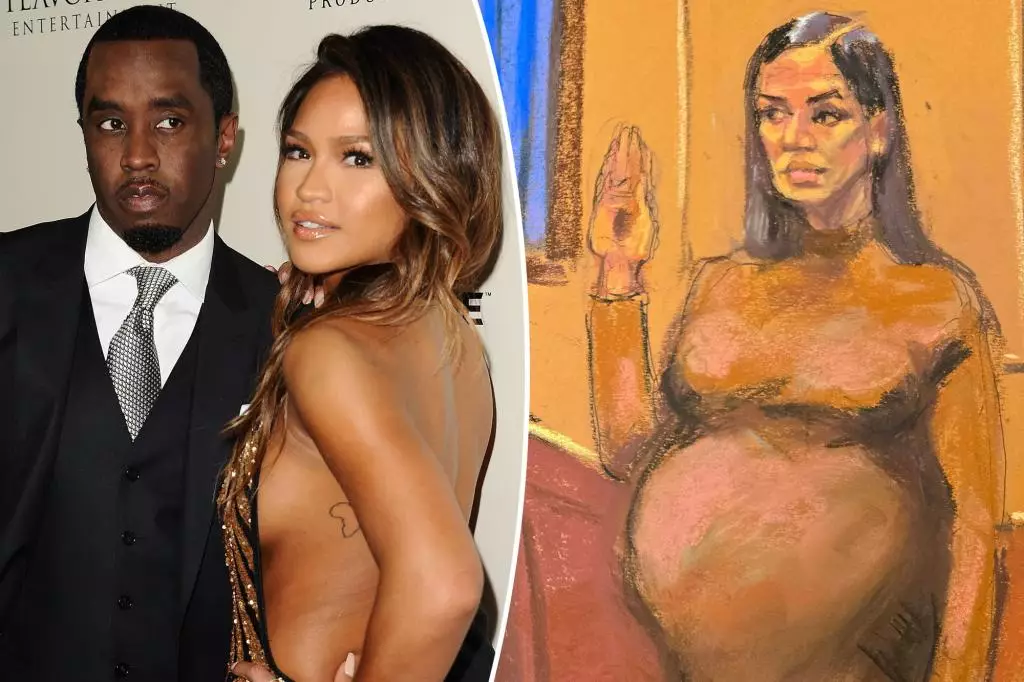In a courtroom that seemed more like the setting for a harrowing drama than a legal proceeding, Cassie Ventura took the stand to expose shocking realities about her past relationship with Sean “Diddy” Combs. With composure amidst chaos, she outlined the notorious “Freak-Offs” that were not merely unconventional gatherings but grotesque spectacles fueled by drugs and denial of human dignity. Ventura intimated that participating in these events became a grim ritual; they weren’t merely activities but obligations that dictated her life. “There was no time to do anything else but do them, then try to recover,” she stated, hinting at an existence shrouded by compulsion and psychological manipulation.
From her description, one could surmise that the “Freak-Offs” were more than the typical raucous parties one might imagine; they evolved into grueling marathons lasting “significant periods of time,” with the extreme lasting up to four days. Such revelations clash with society’s romanticization of celebrity lifestyles, reminding us that behind glitz and glamor can lie profound, disturbing truths.
The Cycle of Abuse
Ventura’s testimony did not merely touch on the sexual dysfunction associated with her relationship; she poignantly recounted episodes of severe physical abuse. Such details echo through the courtroom, shaking the foundations of any remaining delusions about the idealized image of her former partner. With a steady voice, she recalled being verbally deconstructed, being told to “fix [her] face or watch [her] mouth” before the unsettling escalation into violence. The stark and sordid nature of her claims paints Diddy as a figure not just of fame but rather of fear—a juxtaposition that is hard to digest.
The intimate space where love should dwell morphed into a battleground, where even minor disagreements culminated in physical reprisal. Ventura’s account suggests a pattern of control and rage that transcended mere conflict, turning into an oppressive force that she could not escape. A haunting sentiment echoed in her words—they reflect the silent suffering many endure behind closed doors, which society often overlooks in the context of celebrity culture.
The Legal Struggle
Following her courageous decision to file a lawsuit against Combs in November 2023, Ventura bravely documented her struggle against a titan of the music industry. This action was commendable; it is an assertion of autonomy against a backdrop of abuse that many victims still navigate in silence. The rapid settlement of the lawsuit, orchestrated less than a day after it was filed, raises further questions about the implicit acknowledgment of guilt by the immense figures in power and the lengths to which they will go to maintain their public images. It suggests a chilling dynamic where money can silence truths, reinforcing the notion that justice may be a privilege of the powerful.
Yet, the publication of that harrowing hotel surveillance footage only intensified public discourse. Revealing visuals of Ventura attempting to flee from Diddy, illustrating a moment of desperation, served as testament to the control he exercised over her life. Law enforcement’s involvement adds layers to the narrative—the alleged bribery attempt paints a grim picture of how systemic abuse can perpetuate itself through intimidation and influence.
Implications for Society
Combs’ ongoing trial thrusts into the limelight not just his alleged actions but a broader cultural conversation surrounding celebrity accountability. The multitude of accusations against him mirrors a disturbing trend where powerful figures manipulate fame to evade scrutiny. Ventura’s courageous testimony counters societal norms that prioritize celebrity status over victims’ voices, a stand that may encourage others entangled in similar situations to confront their adversities.
The notion of dismantling the myth of infallibility surrounding public figures is crucial in today’s society. Ventura’s story exemplifies how the glamor of celebrity life can often obscure a sinister reality. By exposing the horrors she endured, she paves the way for potential transformations in how we engage with and perceive figures in power, particularly regarding abuse and accountability.
These court proceedings are not simply a fight for Ventura but signify the potential for systemic change. Her bravery resonates deeply, reflecting an urgent need for society to listen, to challenge its complacency, and to foster an environment where silence no longer reigns. Such shifts demand not just admiration but vigorous action against the culture of silence that allows abuse to flourish unchecked.

